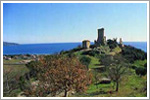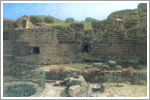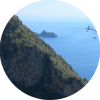History of Velia (Elea)

The town of Velia, known as Elea in Greek, was founded by the inhabitants of Phocaea, a Greek city in Asia Minor conquered by the Persians. According to Strabo, a Greek author who lived during the reign of Emperor Tiberius, the Phocaeans conquered a city in Enotria (a name used by the Greeks to refer to the southern part of Italy, meaning "land of vineyards") and chose to settle there. Indeed, the remains of a small village have been found on the acropolis, confirming Strabo's account. The favorable geographical position, situated in the center of bustling trade between Greece and Etruria, made Elea (Velia) one of the wealthiest cities of Magna Graecia.
The city had two ports (one on the sea and one on the Alento River) and a robust defense system, aided by its rugged terrain and skilled diplomacy. This allowed Elea (Velia) to avoid conquest by the Lucanians, unlike what happened to Poseidonia (Paestum). Elea (Velia) consistently pursued a policy of neutrality, managing to avoid involvement in many conflicts that plagued the relationships between the city-states of Magna Graecia. During the Punic Wars, Elea chose to remain loyal to Rome, providing ships and allowing Rome to maintain substantial control over the Tyrrhenian Sea. The excellent relationship with the new Roman superpower allowed Elea to prosper and even become a sought-after vacation spot.
In 88 BC, the city became a Roman municipality but retained the right to mint coins and speak Greek. The city's decline began for two reasons: Rome built and/or improved major roads that directly connected it to the East via the Adriatic  Sea, and the silting up of its ports, which are now hundreds of meters away from the sea. Cut off from trade routes, Velia gradually shrank and eventually became a small fishing village that was abandoned in the 9th century to escape malaria and Saracen pirate raids, except for the acropolis, where a mighty fortification was erected to protect the few remaining families, which is still visible today. With the name Castellammare della Bruca, the small village survived until the end of the 17th century. In recent centuries, the area was essentially abandoned until the second half of the last century when mass tourism discovered its beaches.
Sea, and the silting up of its ports, which are now hundreds of meters away from the sea. Cut off from trade routes, Velia gradually shrank and eventually became a small fishing village that was abandoned in the 9th century to escape malaria and Saracen pirate raids, except for the acropolis, where a mighty fortification was erected to protect the few remaining families, which is still visible today. With the name Castellammare della Bruca, the small village survived until the end of the 17th century. In recent centuries, the area was essentially abandoned until the second half of the last century when mass tourism discovered its beaches.
The excavations of Velia: Elea (Velia) was a significant cultural center in antiquity; the Eleatic school was crucial in the history of philosophy, and its main representatives were Parmenides, Zeno, and Melissus of Samos. The philosophers Xenophanes and Leucippus also stayed in Elea. At least until 62 AD, a flourishing medical school operated there, and two grammarians, Statius (father of the better-known Latin poet) and Palamedes (2nd century AD), were from Elea.
After a long period of oblivion, the remains of the ancient city were rediscovered in the middle of the last century within the municipal territory of Ascea, enriching the area's tourist offerings related to summer bathing.





